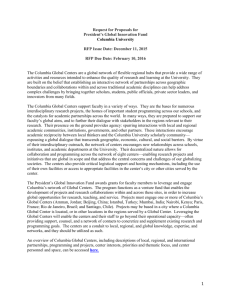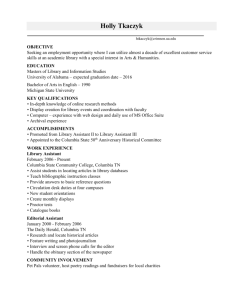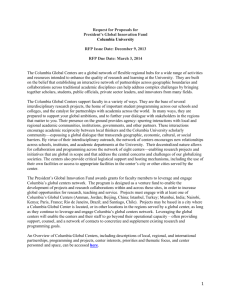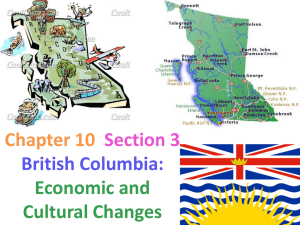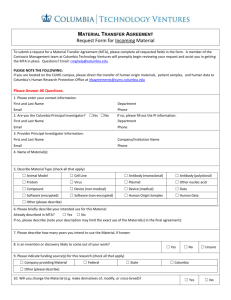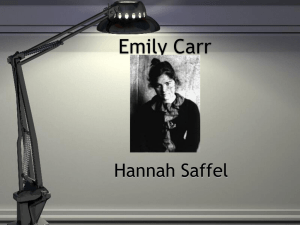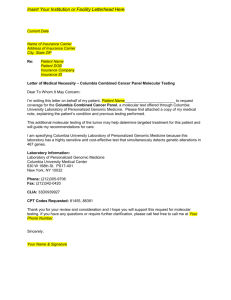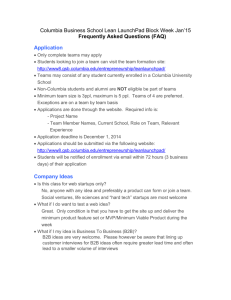Request for Proposals
advertisement
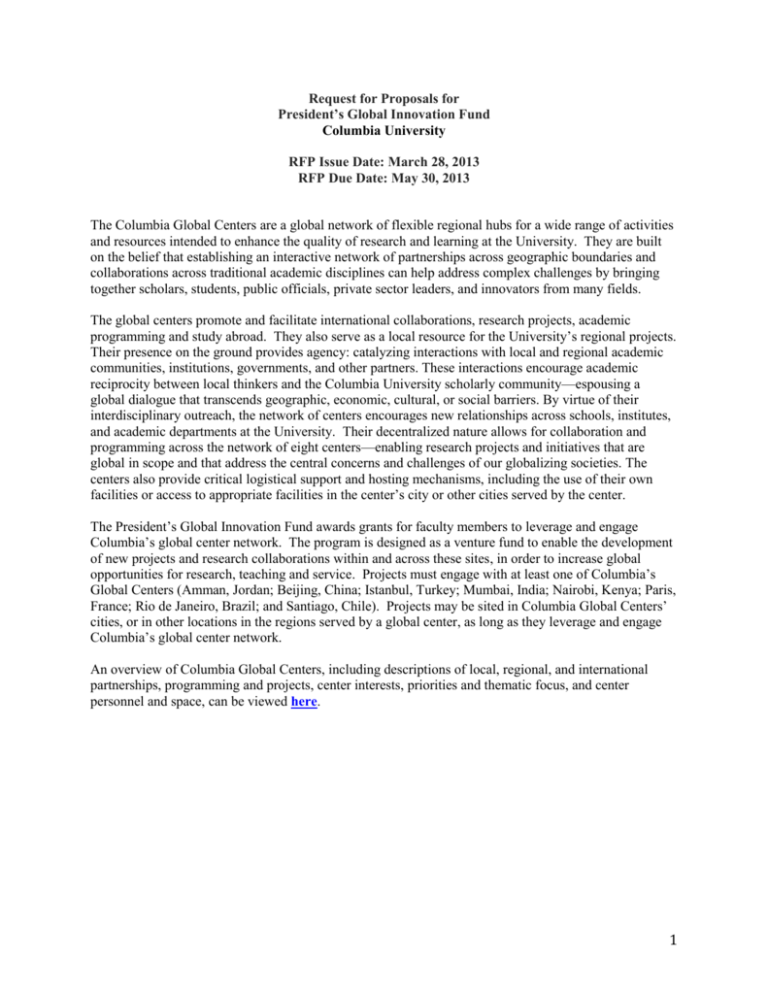
Request for Proposals for President’s Global Innovation Fund Columbia University RFP Issue Date: March 28, 2013 RFP Due Date: May 30, 2013 The Columbia Global Centers are a global network of flexible regional hubs for a wide range of activities and resources intended to enhance the quality of research and learning at the University. They are built on the belief that establishing an interactive network of partnerships across geographic boundaries and collaborations across traditional academic disciplines can help address complex challenges by bringing together scholars, students, public officials, private sector leaders, and innovators from many fields. The global centers promote and facilitate international collaborations, research projects, academic programming and study abroad. They also serve as a local resource for the University’s regional projects. Their presence on the ground provides agency: catalyzing interactions with local and regional academic communities, institutions, governments, and other partners. These interactions encourage academic reciprocity between local thinkers and the Columbia University scholarly community—espousing a global dialogue that transcends geographic, economic, cultural, or social barriers. By virtue of their interdisciplinary outreach, the network of centers encourages new relationships across schools, institutes, and academic departments at the University. Their decentralized nature allows for collaboration and programming across the network of eight centers—enabling research projects and initiatives that are global in scope and that address the central concerns and challenges of our globalizing societies. The centers also provide critical logistical support and hosting mechanisms, including the use of their own facilities or access to appropriate facilities in the center’s city or other cities served by the center. The President’s Global Innovation Fund awards grants for faculty members to leverage and engage Columbia’s global center network. The program is designed as a venture fund to enable the development of new projects and research collaborations within and across these sites, in order to increase global opportunities for research, teaching and service. Projects must engage with at least one of Columbia’s Global Centers (Amman, Jordan; Beijing, China; Istanbul, Turkey; Mumbai, India; Nairobi, Kenya; Paris, France; Rio de Janeiro, Brazil; and Santiago, Chile). Projects may be sited in Columbia Global Centers’ cities, or in other locations in the regions served by a global center, as long as they leverage and engage Columbia’s global center network. An overview of Columbia Global Centers, including descriptions of local, regional, and international partnerships, programming and projects, center interests, priorities and thematic focus, and center personnel and space, can be viewed here. 1 What kinds of projects are candidates for funding? Eligible project types could include: - Support for research collaborations: pilot research projects; exchanges; linkages with local universities, NGOs, government agencies. - Support for the development/implementation of educational or curricular initiatives at the graduate or undergraduate level (new courses and seminars or fieldwork/travel components of campus-based courses; training or group workshop/internship programs, with local partners). - Scholarly events (conferences, workshops, symposia) in collaboration with local scholars/scientists, institutions/organizations. Special consideration will be given to those projects which: - Forge interdisciplinary or inter-school faculty collaborations. - Provide opportunities to students to engage and partner with faculty in research, education, or training in meaningful ways. - Have the potential to grow into a sustainable program. - Require seed funding now, but have the potential to attract external support; or that seek matching funding opportunities. - Engage two or more global centers. Successful project proposals will demonstrate the ways in which a global center will add value to the project, and, ideally, address the potential of the project to enhance the global center network. Who is eligible to apply? Schools, departments, institutes, centers, and faculty (singly or in groups) are all eligible to apply. Applications must be submitted by an individual with the authority to serve as a principal investigator, who will assume primary scholarly, administrative, and financial responsibility for the project. Those eligible to apply are: faculty members with full-time professorial titles, modified or unmodified; instructors; and officers of research. How much funding is available? We anticipate awarding approximately $500,000 this year. All awards will be made on a competitive basis. Award amounts will be determined individually by project. However, project award limits will vary by type of proposal. We invite two types of proposals: - Planning grants (up to $25,000), for a period of no longer than one-year (non-renewable) - Project grants ($25,000-$75,000/year), for a period of up to three years. Under exceptional circumstances, proposals for up to $100,000 per year will be considered. Multi-year grants will be reviewed and renewed annually. 2 What is required to apply for funds? To be considered in this first round competition, applications for funds must be received by May 30, 2013. We anticipate that for future rounds, proposals will be reviewed twice annually, on a schedule to be determined. Proposals must be submitted with the support and sign-off by the principal investigator’s Dean. In developing proposals and budgets, applicants should consult with the director(s) of the relevant global center(s) as well as Safwan Masri, Vice President for Global Centers. An overview of Columbia Global Centers can be viewed here. A completed application must include: A cover page with all necessary signatures (a cover sheet is included at the end of this RFP). Letters of support (required) o from collaborating faculty, describing their commitments o from the dean(s) of the applying school or chair(s) of the relevant department(s) if school/department resources are required for the project. o from global center director(s), describing nature of collaboration and confirming feasibility Letters of support (as appropriate) o from external collaborators, other institutions or investigators Executive Summary (not to exceed 300 words) Proposal (not to exceed 5 pages) describing project, nature of collaboration with relevant global center(s), proposed partners and participants, and expected impact. Budget documents o Detailed budget and narrative (a budget sheet is included at the end of this RFP). Budget items should be listed by expense category (e.g., travel, materials production). Note that the budget should not include costs associated with the global centers (e.g., facility rental, administrative support provided by the global center). o Description of any other funds expected or received for this project Principal investigator’s CV, and if appropriate, the CVs of other key collaborators. How will proposals be reviewed? Proposals will be reviewed by a committee of faculty and administrators representing a range of disciplines and schools, who will make funding recommendations to the President, Provost, and Vice President for Global Centers. The amount of each award, as well as the award duration, will be made on an individual basis. 3 What is required of grantees? Faculty receiving awards will be expected to provide full reporting of funds spent. Unspent funds must be returned. In addition, fund recipients will provide progress updates and agree to have news of their work shared via external communications, such as the Columbia Global Centers website, or other press releases and publications, and to present their work at appropriate forums such as the Columbia Global Centers Annual Summit on campus. Submission Please submit the entire application via email to cuglobal@columbia.edu by May 30, 2013. Proposals will be reviewed in June-July. Contacts For further information related to connections to Columbia Global Center(s), including in-country collaborators, center interests, priorities, and foci, as well as the purpose of the proposal, please contact: Tarik Chelali, tic2105@columbia.edu, 212-854-8716; or Xin Peng, xp2116@columbia.edu, 212-8515921. For further information about the administrative or application process, please contact: Susan V. Smith, svs22@columbia.edu, 212-854-3835; or Sarah Jubinski, sj2385@columbia.edu, 212-854-3843. This RFP can be downloaded at: http://www.columbia.edu/cu/vpaa/docs/PGIF.docx Overviews of each of the Global Centers can be viewed at: http://globalcenters.columbia.edu/files/cgc/Provost-Appendix.pdf 4 Request for Proposals for President’s Global Innovation Fund Columbia University Proposal Cover Page RFP Issue Date: March 28, 2013 RFP Due Date: May 30, 2013 Project Title Applying Academic Unit(s) School: Department/Division/Center/Institute (if applicable): Principal Investigator (individual assuming primary scholarly, administrative and financial responsibility for project) Name: Title: School/Department/Division/Center/Institute: Email: Phone: Administrative Contact Name: Title: Email: Phone: Project Collaboration with Global Center(s) (please check all that apply) ___ Amman, Jordan ___ Beijing, China ___ Istanbul, Turkey ___ Mumbai, India ___ Nairobi, Kenya ___ Paris, France ___ Rio de Janeiro, Brazil ___ Santiago, Chile Funding Request Type of Grant Requested: ___ Planning Grant (up to $25,000 for a period of no longer than one-year; non-renewable) ___ Project Grant ($25,000-$75,000/year for a period of up to three years). Under exceptional circumstances, proposals for up to $100,000/year will be considered Duration: 5 Total Amount of Funds Requested: Application requirements check list ___ ___ ___ ___ ___ ___ ___ Cover page (included at the end of the RFP), with all necessary signatures (Note: Proposals must be submitted with the support and sign-off by the principal investigator’s Dean.) Letters of support (required) o from collaborating faculty, describing their commitments o from Global Center director(s), describing nature of collaboration and confirming feasibility Letters of support (as appropriate) o from external collaborators, other institutions or investigators o from the dean(s) of the applying school or chair(s) of the relevant department(s) if school/department resources are required for the project Executive Summary Proposal (not to exceed 5 pages) describing project, nature of collaboration with relevant global center(s), proposed partners and participants, and expected impact Budget documents o Detailed budget and narrative (budget sheet included at the end of this RFP). Budget items should be listed by expense category (e.g., travel, materials production). Note that the budget should not include costs associated with the Global Centers (e.g., facility rental, administrative support provided by the Global Center). o Description of any other funds expected or received for this project Principal investigator’s CV; CVs of other key collaborators, if appropriate _________________________________ NAME/DEAN ____________________________ SIGNATURE _________ DATE _________________________________ NAME/DEPARTMENT CHAIR/INSTITUTE DIRECTOR/CENTER DIRECTOR (if applicable) ____________________________ SIGNATURE _________ DATE 6 President’s Global Innovation Fund Columbia University Budget Request RFP Issue Date: March 28, 2013 RFP Due Date: May 30, 2013 Project Title: Principal Investigator: Type of Application: ___ Planning Grant ___ Project Grant BUDGET1 Please provide a summary budget of the proposed project. Add lines or categories as necessary. Personnel, including salary and fringe (research assistance) Supplies and materials Meetings and travel (air fare, hotel) Other costs (please specify)2 Total Project Costs $ 0.00 $ 0.00 $ 0.00 $ 0.00 $ 0.00 $ 0.00 $ 0.00 $ 0.00 BUDGET NARRATIVE & JUSTIFICATION Please provide a short description and justification of how funds received from the President’s Global Innovation Fund will be used. 1 Do not include costs associated with the Global Centers (e.g., facility rental, administrative support provided by the Global Center). 2 Grant funds should not be assessed administrative fees. 7
